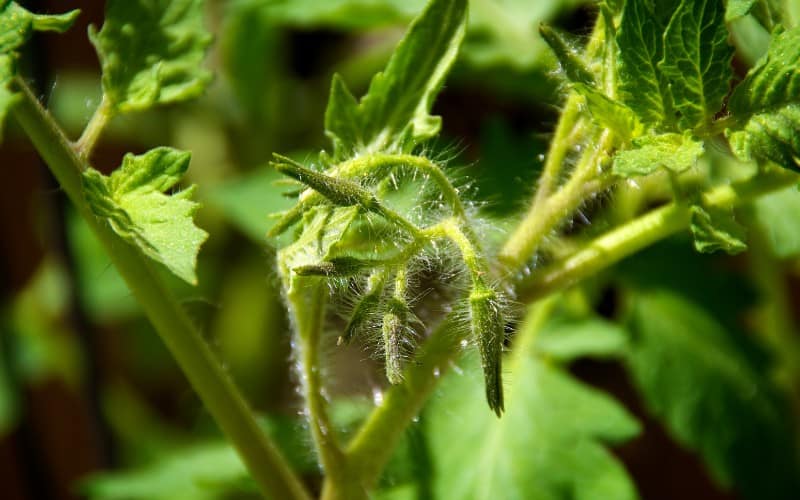Tomato is an edible plant that came from the Americas. It was from there that they spread to all other parts of the world. Tomatoes have umami flavor in large quantities. People eat tomatoes in many ways; they use them to make stews, sauces, and salads.
Tomatoes have many varieties, and they are grown all over the world and at all times of the year. So, it is no surprise that you cultivated tomatoes too.
But as a tomato grower, why do my tomato plants not produce fruit? Well, there are several things that can hinder your tomato plants from producing fruits, such as excess heat, insufficient lights, poor watering practice, inadequate pollination, etc.
In today's post, we'll be looking at, in detail, why your tomato plants are not producing fruits. Let's get started!
Table of Contents
Why Do My Tomato Plants Not Produce Fruit?
Many factors can affect your tomato from bearing fruits. Let us look at some of them in detail.
1. Too Much Heat
Even though tomatoes like high temperatures, they will not be fine if the heat is too much. The excess heat will mess up with the pollination process.
If during the day, the temperature remains over thirty degrees Celsius and then at night the temperature goes below 24 degrees Celsius, your tomato will not bear fruits.
There is hardly any quick remedy or way around this. All you have to do is wait for the hot times to pass. Then remember to always water the tomatoes. This watering will help the tomato pick up when temperatures become optimal again.
You should know the prevalent weather condition at your place. And this knowledge should influence the kind of tomatoes that you cultivate. If the temperature is mostly hot, plant a heat-resistant variety of tomatoes.
The presence or absence of humidity in your locale will also influence the production of fruits by your plants. If the humidity is high, your pollen grains will clog up and won’t drop.
In low humidity, the pollen grains will dry up and roll off. If you have a case of low humidity, you can continuously water the plants to increase the humidity around them.
2. Inadequate Pollination
Tomatoes are dioecious. What this means is that both the female and male flowers are present in one plant. One would think that this will make pollination easier for the tomatoes.
While this may be correct, the tomato plant-and other self-pollinating plants-still needs insects to initiate the pollination process. They nudge the flowers to release pollen.
Bumblebees are instrumental for the pollination of tomatoes. When they fly around the plants, they vibrate their wings, and the vibration shakes the pollen from the anther to the stigma and pollination has taken place.
If you are cultivating indoors or inside a greenhouse, bees may have a hard time coming to initiate pollination in there. Especially if you keep the doors and windows shut always.
And if there is no pollination, there is no fruit production. So, you will want to open those doors and windows, air will come in, and so will beneficial insects.
If you have your tomatoes not bearing fruits, you can as well shake them gently yourself. This gentle shake will also release pollen.
3. Insufficient Lighting
One of the essential requirements of plants and by extension, the process of photosynthesis is light. Without light, the production of food will be nearly impossible.
Your tomatoes need at least eight hours of sunlight for them to grow and produce fruits. If they do not get this amount of sunlight, you will only have lush green leaves with no fruits at all.
If the tomatoes are in a greenhouse, you can ensure they face the sun. Transplant any tomatoes planted where the sun cannot reach.
Read Also: Plants That Grow In Fluorescent Light
4. Insufficient Water
Water is another condition that needs to be available before your plant can produce food (fruit). If your tomatoes are not getting enough water, they will only make flowers and not fruits. Ensure that you water your plants judiciously.
5. Wrong or Insufficient Fertilizers
The fertility of the soil on which you planted your tomatoes is also another thing to consider if your tomatoes are not bearing fruits. If the soil lacks nutrients, the plants will not flower, and fruits will not come.
After the initial flower blooms, add fertilizers to your soil. These fertilizers should be high in potash or potassium. They help flowers bloom and then initiate fruit production.
6. Improper Planting Space
Tomatoes are quite fragile plants. And they are prone to catching diseases and attracting pests. If you plant your tomatoes too close, your plants will produce only a few fruits.
Growing the tomatoes close will mean that diseases can spread around the plants. And some of these infections, like botrytis, can make your tomatoes not to bear fruits. Use a 2 feet spacing in between one tomato plant and another.
Conclusion
It is genuinely not funny that you have to ask this question, ‘why do my tomato plants not produce fruit?’ everyone would want their plant to grow without hitches.
But life is rarely that straightforward or easy. If the tomato plants are not yielding fruits, you have to make sure that some things are in place to initiate the yielding of fruits.
Check if the plants have enough water, sun, fertilizer, light, pollination, and planting space. Once you have taken care of these, you have to rest and then let nature do its work.





